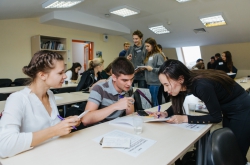You came to Russia in the early 2000's. Were you already a university student at that time?
I graduated from school in Colombia, and then entered the Politecnico Grancolombiano university where I studied advertising and marketing. Yet, I can't share much about student life in Colombia, as I only studied there for a year and then moved to Russia.
I came here in 2001, though not to St. Petersburg. I was part of a large group of Colombian students from Bogota, where I come from, and we first went to Novosibirsk to study the Russian language. At first, it was very hard, we didn't even know the basics, yet we really liked it there. Having decided that this experience was a success, we moved on to Moscow, yet didn't really like it there.
What did we know about Russia at that time? St. Petersburg, Pushkin, and the like. That is why we decided to try going to St. Petersburg as well, where we continued our studies. At the end of the year, we went back to Colombia, but decided to continue our education in St. Petersburg. At that time, all of my foreign acquaintances - from Finland, Italy, Spain - were there, so maybe I stayed here for that reason. In the end, it took us only two years to learn Russian; and after that, I succeeded in getting a scholarship at the Polytechnical university.

Politecnico Grancolombiano University. Credit: static.iris.net.co
At that time, you just graduated from high school. Weren't you afraid of going to Russia, a foreign country thousands of kilometers away?
Well, I've always had this advantage: my father really liked everything that had to do with the Soviet Union. He even was part of the communist movement in Colombia for some time, so he knew a lot about first USSR, then Russia; actually, he still follows Russian news. So, he was never against me going here. On the other hand, I couldn't go to the US as I didn't have a visa, so I started to search for different options. I had all the documents I needed to go to Russia done in about a month, it was almost fate. We bought the tickets some two weeks before going.
All people are different; some can easily adjust to new surroundings. I like to travel, I've visited half of the world, and maybe it was because I like trying new things that I decided to move so far away from home. Here I found my love - my wife is from St. Petersburg. We have a daughter. And, surely, that is another reason for staying here.
When did you start to do business? Back when you were still a student?
Yes, it was around that time that I started to learn about startups. I launched my first one at the university; at the time, we didn't even know that it was a startup. That project gave me many things. I was working closely with the Colombian embassy at that time, I had my internships there, and I managed to acquire many contacts - not only from the Colombian side, but from the Russian side as well. In the end, I even took part in the St. Petersburg International Economic Forum as part of the embassy's delegation.
The point of my project was to unite Russian and Colombian companies. It was one of the first aggregators, a website that hosted information for Russian companies in Russian and for Colombian companies in Spanish. That allowed companies to learn more about each other, contact each other and cooperate. As for me, I earned my share by receiving commission for representing different companies. I spent about two years working on this project, and I earned good money for a student.

Bogota, Columbia. Credit: varlamov.me
And how did you start collaborating with ITMO UNiversity?
This is a really interesting story. By that time, I were working with startups for four years already. Yet, while formerly I took part in different projects myself - I had my own agency, we developed websites, applications, chatbots - after my trip to Barcelona where I studied marketing and e-commerce, everything changed.
I already had a good job, a family - well, everything was fine. Yet, I understood that I did everything I could for the companies I was working for, and I won't be able to think up anything new. In 2013, we returned to St. Petersburg from Barcelona, and I started working with American companies and focus on startups more and more. By that time I already knew a lot: I studied the basic methods, learned on my own mistakes and gained lots of valuable experience, which helped me to quickly check different assumptions and understand what will work and what won't, how can I improve certain ideas and the like. Soon, I started to receive propositions to work with other startups. I started to help novice entrepreneurs from Latin America, and work more with the corresponding communities.
At some related event, I met Elena Gavrilova, we started to communicate, then met at other joint events - Startup Village, Startup Day and the like, and I offered her my help. By that time I already had particular experience that I could use for training others, and the understanding of what I should do to help. I didn't get any help when I was doing my first projects at the Polytechnical university, so I could never hope to do what novice entrepreneurs can do now. If I received such help then, 20 years ago, everything could've been different.
 Elena Gavrilova
Elena Gavrilova
In the end, I was invited to participate in different events. For instance, I was a mentor at GenerationS in 2016; last year, I took part in the PhysTech acceleration program, where I worked with startups I would've never thought I'll ever work with. After that, I started to take part in programs by ITMO's business incubator: at first I just gave some advice, and this year I became a mentor for the program they collaborate with MIT on - MIT Global Startup Labs, as well as work with students from South Korea as part of the SumIT international summer school.
The startup movement in Russia is quite young; ITMO University was one of the first in Russia to launch programs for supporting novice entrepreneurs. Yet, in many universities the work on such systems is still in progress. What problems do they usually face? And what are the necessary conditions for creating a system for supporting student entrepreneurship?
As of now, every other university has its business incubators, especially in big cities. Yet, in my opinion, only at ITMO University this system is 100% effective.
If we're talking about the situation in general, the problem is not about the students being not smart enough or not having ideas. No, it's the other way round. Still, they often don't know where to go with these ideas, they don't understand which first steps they are to make. So, the system in Russia is somewhat lacking.
For it to work, there has to be motivators who will turn the students' attention to such things. On the other hand, we should bear in mind that such programs can be of use only to those students who feel the desire to create something, do business. Not everyone can do that.
I know many people who just can't be entrepreneurs: surely, they want to do certain things, but their ideas never develop into projects. So, apart from a motivator, the student's desire and understanding of what he wants to do is also important.
 Participants of the SumIT international summer school
Participants of the SumIT international summer school
How does one get this understanding?
In my opinion, it is better to develop it from childhood. And schools can greatly contribute to it, as well. In Russia, there are examples where they start to focus on developing certain skills and competencies during a student's seventh or eighth year. Yet, I believe that you have to start developing these skills even earlier, when children are still very little.
And if a person who wants to start his own business is already an adult? What are the first steps he has to take?
Even before starting, you have to understand how to make goals, work with ideas and learn if you know how to manage your time. There are people who just don't get how important that is. Also, it is important to understand what exactly you want to do. For instance, you want to be an engineer. Great. Did you ever try programming? No. And then, after a couple of years spent on learning to code, it turns out that you no longer want to do it - it's just not your thing.
All of these steps are quite simple, and something you have to do even before you decide to become an entrepreneur, as you will then have to set goals and achieve them, show some real results every day. If you skip on that, it’ll be very hard for you.
After that, you will need to get experience by participating in different acceleration programs. Some people still tell me that they see no point in that, that they didn't like a particular accelerator and it was a waste of time. Yet, that is very subjective, and it doesn't mean that the program or accelerator is bad. In any case, participating in them brings experience.

Dave Vasques at SumIT's Demo Day
People in Russia are beginning to understand what the startup movement is all about. Most of its centers are in the capitals, in other cities the ecosystem develops slower. Can the situation be changed for the better?
Well, this is what ITMO University is working on - it launches programs in different cities, develops collaboration with other regions and shares experience and knowledge. Also, many meet-ups are now organized all over Russia, and people are starting to understand what they are for. Some four years ago the situation was different.
 Participants of the SumIT international summer school
Participants of the SumIT international summer school
The development of the startup culture and launching of programs on technological entrepreneurships is now discussed at the highest level, as well. The Ministry of Education and Science is now working on a road map for this purpose. In your opinion, is it the government's task - to develop the global system for teaching technological entrepreneurship?
Definitely, especially in Russia, where the government makes the most important decisions. In Russia, they understand that the best universities are state universities, not private ones. So, working on the development of technological entrepreneurship in close collaboration with the government is a good initiative. On the other hand, there are also to be private institutions that will work in this field. In this case, I believe public-private structures will be most effective.
Yet, I repeat myself, it is better to start this work back in schools. A great example of that is the Finnish educational system. They don't have homework assignments, yet their education is of a high level. They make children do what they want: if they like programming, they code, if they like drawing, they draw. Thus, they develop in a particular field and learn to create something of their own. From their early years, they get the understanding of the fact that they are totally free yet solely responsible for the results of their work.
Is it possible to do that in Russia? I mean, our educational system is quite tradition-bound, especially in what has to do with schools.
I was born in Colombia, but I spent about half of my life in Russia. And in the course of this time, I noticed how the situation changes - in education, family values, attitudes towards people's lives. A lot changed during these 13-14 years. And I believe most of these changes are for the better.
What are your future goals now?
I continue to be a mentor at ITMO's business incubator. As soon as this September, the university will launch a new program, in which anyone who wants to develop their independent projects can participate. I'm sure we can expect many new, successful startups.






